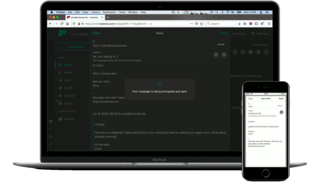Pretty Good Privacy (PGP) is an encryption program that provides cryptographic privacy and authentication for data communication. PGP is used for signing, encrypting, and decrypting texts, e-mails, files, directories, and whole disk partitions and to increase the security of e-mail communications. Phil Zimmermann developed PGP in 1991.

Mozilla Thunderbird is a free and open-source email client that also functions as a personal information manager with a calendar and contactbook, as well as an RSS feed reader, chat client (IRC/XMPP/Matrix), and news client. Operated by MZLA Technologies Corporation, a subsidiary of the Mozilla Foundation, Thunderbird is an independent, community-driven project that is managed and overseen by the Thunderbird Council, which is elected by the Thunderbird community. As a cross-platform application, Thunderbird is available for Windows, macOS, FreeBSD, Android, and Linux. The project strategy was originally modeled after that of Mozilla's Firefox, and Thunderbird is an interface built on top of that Web browser.

Mail, also known as Apple Mail, is an email client included by Apple Inc. with its operating systems macOS, iOS, iPadOS, watchOS, and visionOS. Mail grew out of NeXTMail, which was originally developed by NeXT as part of its NeXTSTEP operating system, after Apple's acquisition of NeXT in 1997.
Hushmail is an encrypted proprietary web-based email service offering PGP-encrypted e-mail and vanity domain service. Hushmail uses OpenPGP standards. If public encryption keys are available to both recipient and sender, Hushmail can convey authenticated, encrypted messages in both directions. For recipients for whom no public key is available, Hushmail will allow a message to be encrypted by a password and stored for pickup by the recipient, or the message can be sent in cleartext. In July 2016, the company launched an iOS app that offers end-to-end encryption and full integration with the webmail settings. The company is located in Vancouver, British Columbia, Canada.

Gmail is the email service provided by Google. As of 2019, it had 1.5 billion active users worldwide, making it the largest email service in the world. It also provides a webmail interface, accessible through a web browser, and is also accessible through the official mobile application. Google also supports the use of third-party email clients via the POP and IMAP protocols.
S/MIME is a standard for public-key encryption and signing of MIME data. S/MIME is on an IETF standards track and defined in a number of documents, most importantly RFC 8551. It was originally developed by RSA Data Security, and the original specification used the IETF MIME specification with the de facto industry standard PKCS #7 secure message format. Change control to S/MIME has since been vested in the IETF, and the specification is now layered on Cryptographic Message Syntax (CMS), an IETF specification that is identical in most respects with PKCS #7. S/MIME functionality is built into the majority of modern email software and interoperates between them. Since it is built on CMS, MIME can also hold an advanced digital signature.

The Bat! is an email client for the Microsoft Windows operating system, developed by Moldovan software company Ritlabs. It is sold as shareware and offered in three editions: Home Edition, Professional Edition, and Voyager which is a portable version and is included with Professional Edition.
Google Workspace is a collection of cloud computing, productivity and collaboration tools, software and products developed and marketed by Google. It consists of Gmail, Contacts, Calendar, Meet and Chat for communication; Drive for storage; and the Google Docs Editors suite for content creation. An Admin Panel is provided for managing users and services. Depending on edition Google Workspace may also include the digital interactive whiteboard Jamboard and an option to purchase add-ons such as the telephony service Voice.
Email encryption is encryption of email messages to protect the content from being read by entities other than the intended recipients. Email encryption may also include authentication.
Secure messaging is a server-based approach to protect sensitive data when sent beyond the corporate borders, and it provides compliance with industry regulations such as HIPAA, GLBA and SOX. Advantages over classical secure e-mail are that confidential and authenticated exchanges can be started immediately by any internet user worldwide since there is no requirement to install any software nor to obtain or to distribute cryptographic keys beforehand. Secure messages provide non-repudiation as the recipients are personally identified and transactions are logged by the secure email platform.

eM Client is a desktop email client for Windows and macOS. Its functions include sending and receiving email, managing calendars, tasks, contacts, notes, and chat. It was originally released in 2007 and still receives regular updates as of May 2024. Versions for Android and iOS were released in 2024.

Mailbird is a desktop email client for Microsoft Windows and MacOS, compatible with Windows 10 and Windows 11, and with Ventura or higher for Mac devices. Mailbird is offered via a paid subscription, but also includes a free version for both Windows and Mac users.

Proton Mail is a Swiss end-to-end encrypted email service co-founded in 2013 by Andy Yen. Proton Mail uses client-side encryption to protect email content and user data before they are sent to Proton Mail servers, unlike other common email providers such as Gmail and Outlook.com. Proton Mail is run by Proton AG, which also operates Proton VPN, Proton Drive, Proton Calendar, Proton Pass and Proton Wallet.

Tuta, formerly Tutanota, is an end-to-end encrypted email app and a freemium secure email service. The service is advertisement-free; it relies on donations and premium subscriptions. As of June 2023, Tutanota's owners claimed to have over 10 million users of the product. The company announced a transition to 100% renewable electricity in March 2019. This decision coincided with employee participation in Fridays for Future protests. On 1st October 2024, Tuta launched its standalone encrypted calendar app. Tuta Mail has recently integrated post-quantum cryptography features through its new protocol - TutaCrypt replacing standard encryption methods like RSA-2048 and AES-256 for its newly created accounts after March 2024.
Nylas Mail is an open-source desktop email client by Nylas, known for its emphasis on user-contributed extensions. It was formerly known as Nylas N1 and was rebranded as Nylas Mail starting with the January 17, 2017 release.

Mailfence is an encrypted email service with a focus on security and privacy that offers OpenPGP based end-to-end encryption and digital signatures for usage in emails. It was launched in November 2013 by Belgium-based company ContactOffice Group, which has been operating an online collaboration suite since 1999.

Efail, also written EFAIL, is a security hole in email systems with which content can be transmitted in encrypted form. This gap allows attackers to access the decrypted content of an email if it contains active content like HTML or JavaScript, or if loading of external content has been enabled in the client. Affected email clients include Gmail, Apple Mail, and Microsoft Outlook.

Spike is a multi-platform application designed to function both as an email client and a business messaging and collaboration tool, available on Windows, MacOS, iOS, Android and the web. It has a chat-like, conversational view for emails, along with additional integrated features. Depending on the selected plan, it can be used solely as an email application or as a full suite of business communication tools.
Proton AG is a Swiss technology company offering privacy-focused online services. It was founded in 2014 by a group of scientists who met at CERN and created Proton Mail.

Skiff was an email service startup company and collaboration tool, that provided privacy-friendly end-to-end encrypted Email and Cloud services. The company's commercial strategy was focused in offering to its clients a Source-Available or Open-Source, transparent and audited Email, Calendar, and Cloud Storage services without trackers or advertisements.











